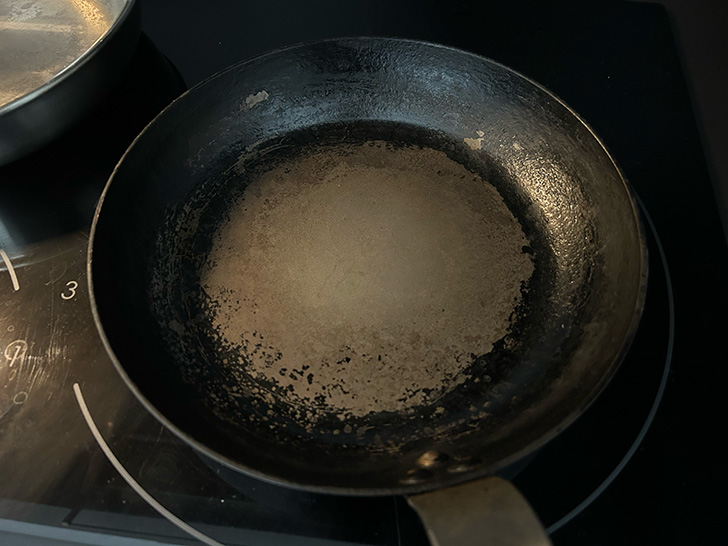Did your carbon steel pan get rusty? You can fix it in just a few minutes using common kitchen items that everyone has.
You were excited about cooking dinner until you opened the cabinet and saw that your trusty carbon steel pan had gotten rusty while being stashed away.
Oops! Don’t worry: it’s salvageable and it can happen to anyone. Before you go searching for a new pan, stick with me and try the steps in this guide. Fixing a rusty carbon steel pan is actually pretty easy: All you’ll need is a few minutes, some soap and vinegar, and a little bit of elbow grease.
Remove Rust From Cast Iron Pan
Equipment
- Steel wool
- Kitchen scrubber or scrub sponge
Materials
- Dish soap
- Distilled white vinegar
Instructions
Removing the Rust
- Scrub the rust off of your carbon steel pan with soapy water and a steel wool pad. Don't rush, take your time, and try to get rid of as much of the rust as you can.
- Put the pan on the stovetop and fill it halfway with a mixture of equal parts distilled white vinegar and tap water. Let the solution come to a boil and allow it to simmer for 1½ to 3 minutes. The longer you let it boil, the better (just don't let it evaporate and boil dry).
- Take the pan off the heat and wait until it cools down to a safe temperature. Once it's no longer too hot to touch, give it another scrub using soapy water and a kitchen scrubber or the rough side of a soft sponge. Afterward, dry it off by patting it with a few paper towels.
Seasoning the Pan
- Put the pan back on the burner and heat it over medium heat for about 4 to 5 minutes, then remove it from the heat and wait for it to cool down. This will help evaporate any remaining moisture from the cleaning.
- Once the pan has cooled down, place it back on the burner. Take a makeup pad, paper towel, or lint-free cloth and apply a very thin layer of cooking oil on the surface. Rub the oil all over the pan until it looks shiny and evenly coated.
- Turn on the range hood to the highest setting and open your windows because it might get smoky. Heat the pan over medium-high heat for about 5 minutes. As the oil starts to smoke, the surface of the pan will turn golden, indicating that you've seasoned it correctly.
If everything went well, you will have turned this:

Into this:

If you accidentally added too much oil and the surface became sticky in certain areas during the seasoning, don’t worry.
You don’t need to go through the whole seasoning process again. Simply take a paper towel and sprinkle some fine salt on it, then rub the surface of the pan. The salt will help remove the sticky, baked-on oil.
Why Did Your Frying Pan Get Rusty?
Similar to cast iron, carbon steel is a type of metal that can react to moisture and start to rust if exposed to too much of it.
If you wash your carbon steel skillet and forget to dry it properly before putting it away in the kitchen cabinets, it will quickly rust by the next time you use it.
To prevent my carbon steel skillets from rusting, I like to heat them over medium heat for 2-3 minutes after washing. This helps to ensure that any remaining moisture evaporates from the cooking surface, making them ready for storage.
Can You Cook in a Rusty Carbon Steel Pan?
Don’t cook in a carbon steel pan that has rusted. If you notice rust on your pan, make sure to remove it and then season the pan again before using it again.
While ingesting a small amount of rust may not necessarily be harmful, it can affect the taste and appearance of your food as the rust could react with other ingredients. Plus, inhaling or consuming rust is one of those things that we instinctively know are not good for us—for a reason.1U.S. Department of Agriculture (2023, March 24). Is it safe to use rusty utensils? AskUSDA. Retrieved July 29, 2023, from https://ask.usda.gov/s/article/Is-it-safe-to-use-rusty-utensils
